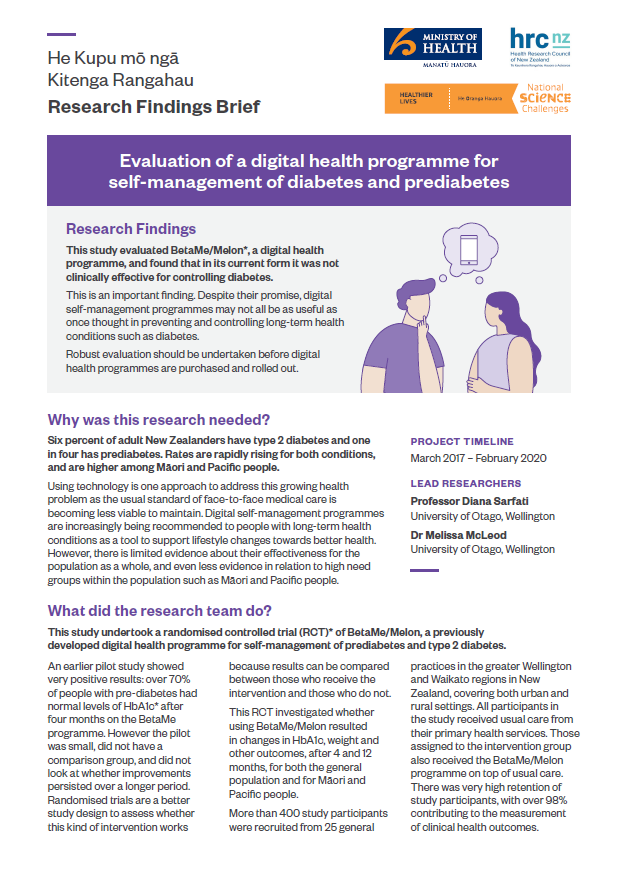Testing the effectiveness of digital programmes for self-managing diabetes
16 December 2020
Research undertaken through the Long-Term Conditions Partnership* recently published findings that are important for health planners and funders.
Increasing burden of non-communicable diseases
Demands on New Zealand’s primary healthcare system are rapidly increasing. Workforce shortages and rising rates of non-communicable diseases, such as type 2 diabetes, mean the usual standard of face-to-face medical care is becoming harder to maintain.
That’s where digital self-management programmes come in.
Options for managing health remotely can be a lifeline for some, and digital self-management programmes are increasingly being recommended to support lifestyle changes towards better health.
However, it’s unclear how effective specific programmes are for the overall population, and there’s even less evidence for Māori and Pacific people.
Digital programme for self-managing diabetes

Melon (formerly named BetaMe) is a digital health programme for self-managing diabetes. A small pilot study showed promising results – after using the programme for four months, more than 70% of people with prediabetes had normal levels of HbA1c (a measure of average blood sugar levels for monitoring type 2 diabetes and prediabetes).
A research team led by Professor Diana Sarfati and Dr Melissa McLeod from the University of Otago, Wellington, undertook an evaluation of Melon/BetaMe to see whether these results could be replicated over a longer period in a randomised controlled trial (RCT).
RCTs are better for assessing this kind of intervention because participants are randomly allocated to the intervention or a “control” group which receives usual care (not included in the pilot study). Subsequent health changes can be compared between those who do and don’t receive the intervention, and the randomisation step aims to make these two groups comparable on all other dimensions (e.g. the same mix of males and females in the two groups).
No evidence for improved outcomes
This project had unexpected findings. The researchers found no evidence for a difference between the clinical outcomes of the intervention and control groups after 12 months, and concluded there was no lasting benefit from using the BetaMe/Melon programme compared to receiving usual diabetes care.
There was some evidence that the intervention had a small negative impact on quality of life.
The study was published in the high-profile international diabetes journal Diabetologia.
Robust evaluation essential
This research will be useful for health policy, investment and practice in New Zealand, and shows the importance of robust evaluation of each new technology and programme before investing.
While it’s becoming essential to expand the range of options for preventing, treating and managing long-term conditions, the health system can be resistant to change and slow to adopt new technologies, making it even more important to have good evidence about them.
“These findings show that digital programmes, alongside or after trialing, need to be properly evaluated before they are purchased and rolled out en masse,” said Karen Evison, Director of Strategy, Planning and Funding at Lakes DHB.
“There may be opportunities to use these types of programmes more successfully alongside other care but that would require further research,” she said.
What works
A follow-up process evaluation, published in the Journal of Medical Internet Research, identified possible areas of future improvement. It examined how participants used the programme, and identified what they found most (and least) useful.
It showed the BetaMe/Melon was generally well received by participants, and initial engagement with the health coach was high. However, engagement with other components varied by participant demographic and dropped rapidly over the 16-week active programme.
To maximise satisfaction, engagement and potential health benefits from digital self-management programmes the researchers suggest the following steps:
- find out how to maintain the engagement of participants over time,
- individualise programmes,
- address technical barriers to engagement.
*Long term conditions partnership research
The evaluation of Beta Me/Melon was one of five research projects funded by the Long-Term Conditions partnership between Healthier Lives, the Health Research Council, and the Ministry of Health, to find better ways of tackling the ever-growing burden of long-term health conditions.
Publications
- Impact of a comprehensive digital health programme on HbA1c and weight after 12 months for people with diabetes and prediabetes: a randomised controlled trial Diabetologia (2020)
- A Mobile- and Web-Based Health Intervention Program for Diabetes and Prediabetes Self-Management (BetaMe/Melon): Process Evaluation Following a Randomized Controlled Trial J Med Internet Res (2020) 22(12):e19150
Download the Research Findings Brief. [PDF 119KB]



